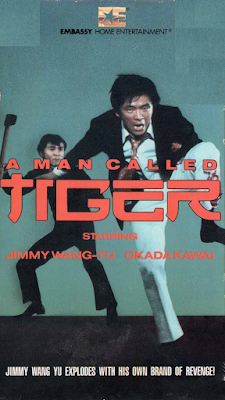A Man Called Tiger (1973)
Chinese Title: 冷面虎
Translation: Cold-Faced Tiger
Starring: Jimmy Wang Yu, Okada Kawai, Maria Yi,
James Tien, Tien Feng, Han Ying Chieh
Director: Lo Wei
Action Director: Han Ying Chieh
I miss the days of VHS and video stores. Every visit
was an adventure, browsing through the titles and trying to determine what to
rent via the box art, which frequently displayed more effort and creativity
than the film it was trying to sell. Most Mom n’ Pop video stores and Hollywood
Video had their own Martial Arts section, while Blockbuster Video lumped
martial arts films into their Action/Adventure Sections. At least that’s how it
was in Stockton, CA. But there was a paradox at work in my life, as I often
found myself hesitant to rent martial arts/Hong Kong movies that left my
so-called “comfort zone,” which is why I saw Hard Boiled a myriad of times while lesser-known
movies like A
Man Called Tiger and Bruce vs. Bill stared me in the face, daring me to
rent them, only to be ignored by yours truly. I regret my unwillingness to take
a step into the dark, which is why, for Golden Harvest Month, I shall correct
one of many mistakes made in the past and review A Man Called Tiger. I owe this to Jimmy Wang Yu, and far be
it from me to be a man who does not pay off his debts.
The story is simple, and yet unnecessarily complex.
Wang Yu plays Chin Fu, a Chinese kung fu expert who heads over to Japan looking
for work among the local Yakuza. After beating up an enforcer (Han Ying Chieh,
who doubled as the film’s fight choreographer) at the local night club, Chin Fu
is invited by Yakuza boss Shimizu to be one of his right-hand men. His job is
to take back the extortion racket from the rival Yakuza gang led by Yamamoto
(Tien Feng), one business at a time. One such business is a Chinese restaurant
ran by a fellow kung fu student (James Tien). The two secretly meet and we
learn that Chin Fu’s father had some dealing with the Yakuza, which ultimately
caused him to lose his school and commit suicide. So he’s posing as a Yakuza in
order to find out the truth. James Tien’s character offers to go undercover in
Yamamoto’s organization to find out what he can, but the movie quickly forgets
about him until the climax.
To be perfectly honest, the deeper into the story we
go, the less everything makes sense. Subplot after subplot is added, including
no less than two female characters who are looking for their fathers; an
attempt by Han Ying Chieh to get back in his boss’s graces by killing Chin Fu;
a love interest subplot involving a girl, Iliako (Maria Yi), who works for
Yamamoto; and a climax involving high stakes gambling where no less than three
new important characters are introduced. Moreover, we never find out *what*
caused Chin Fu’s father to commit suicide (only who was responsible), which was
the whole reason for the film to exist in the first place! In other words,
there’s far too much plot for a 76-minute kung fu movie. Originally, this was
supposed to be Bruce Lee’s third movie, until the Little Dragon had a falling
out with director Lo Wei. With that in mind, you’ll notice a large similarity
in the casts of this film and both The Big Boss and Fist of Fury. I sort of wonder how it might’ve turned
out with Bruce in the lead role, and I can’t help but think that it would’ve
been almost as uneven as The Big Boss, with the fight scenes being the
memorable part while viewers would just ignore everything in between (at least
this would’ve benefitted from having more Bruce Lee action than his Freshman
effort).
But if you can’t get the best, then you at least try
to get the…*cough*…second best. To be perfectly honest, the second best
would’ve been Angela Mao Ying, but the idea of a Chinese woman going to Japan
circa 1970 to become a Yakuza enforcer is rather silly, so I can see why they
stuck with a male actor. Obviously, in 1973, the title of “second best”
would’ve gone to Ti Lung (on contract at the Shaw Brothers), Chen Sing, or
Yasuaki Kurata…so then you go to the guy whose name had the greatest marquee
value, so you get Jimmy Wang Yu. Now, remember the first Austin Powers movie where Elizabeth Hurley can
hardly believe that Austin Powers was a sex symbol in his day, only for her
mother to explain to her that back in the 60s, you didn’t need to be handsome
to be a sex symbol? Well, Hurley well could’ve been talking about Jimmy Wang Yu
in this movie. The man always looked as if he had gotten beaten with the ugly
stick at some point in his life, although his face hadn’t gotten pudgy at this
point, and yet there are no fewer than four…FOUR…attractive women who are
trying to get a piece of his wang (pun fully intended). Despite all that
potential to be sleazy, there’s less exploitation of women than there was in
the two Bruce Lee movies that Lo Wei directed. Wang Yu is more interested here
in being a stoic bad-a** and punching people in the face, which he does
handily.






No comments:
Post a Comment